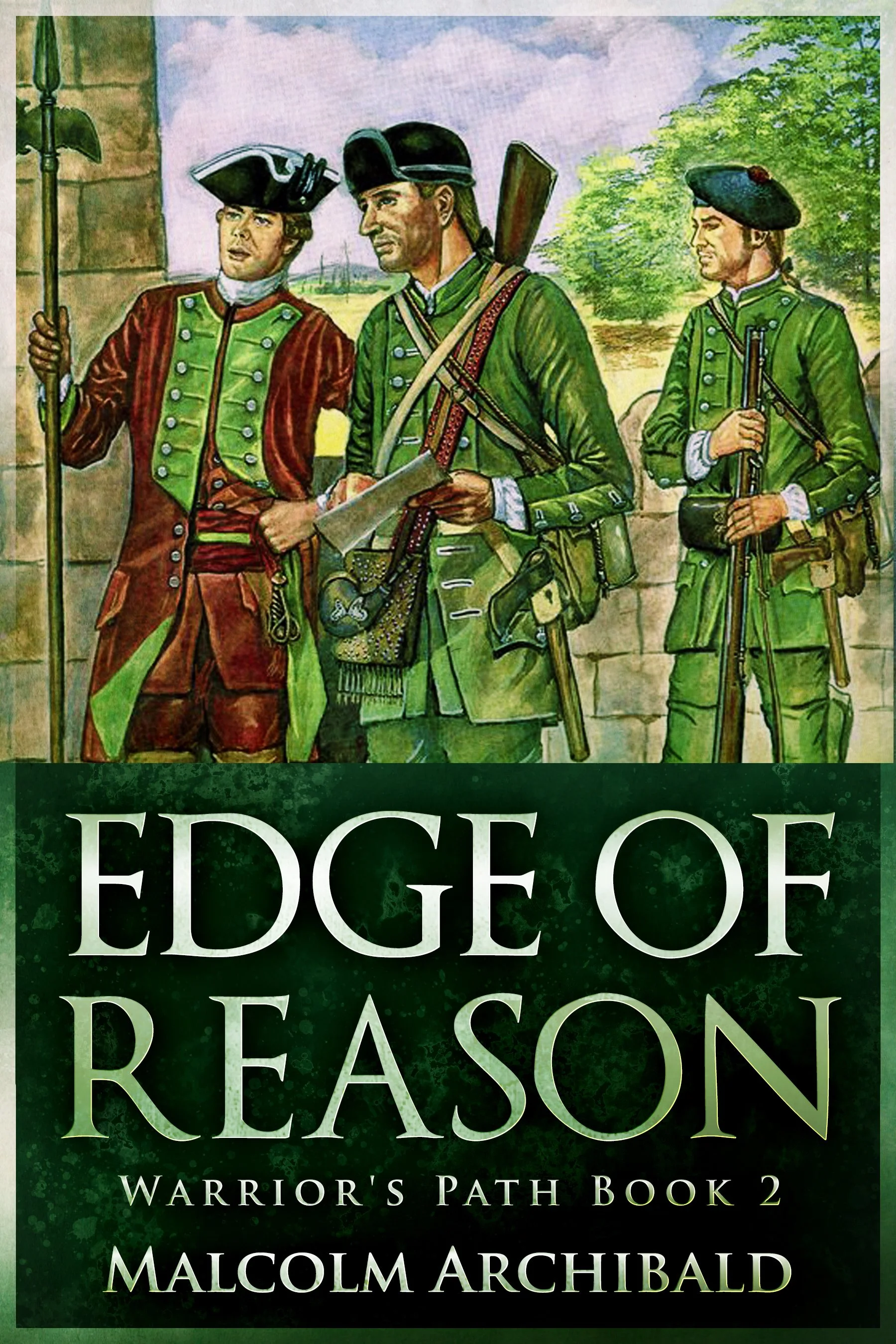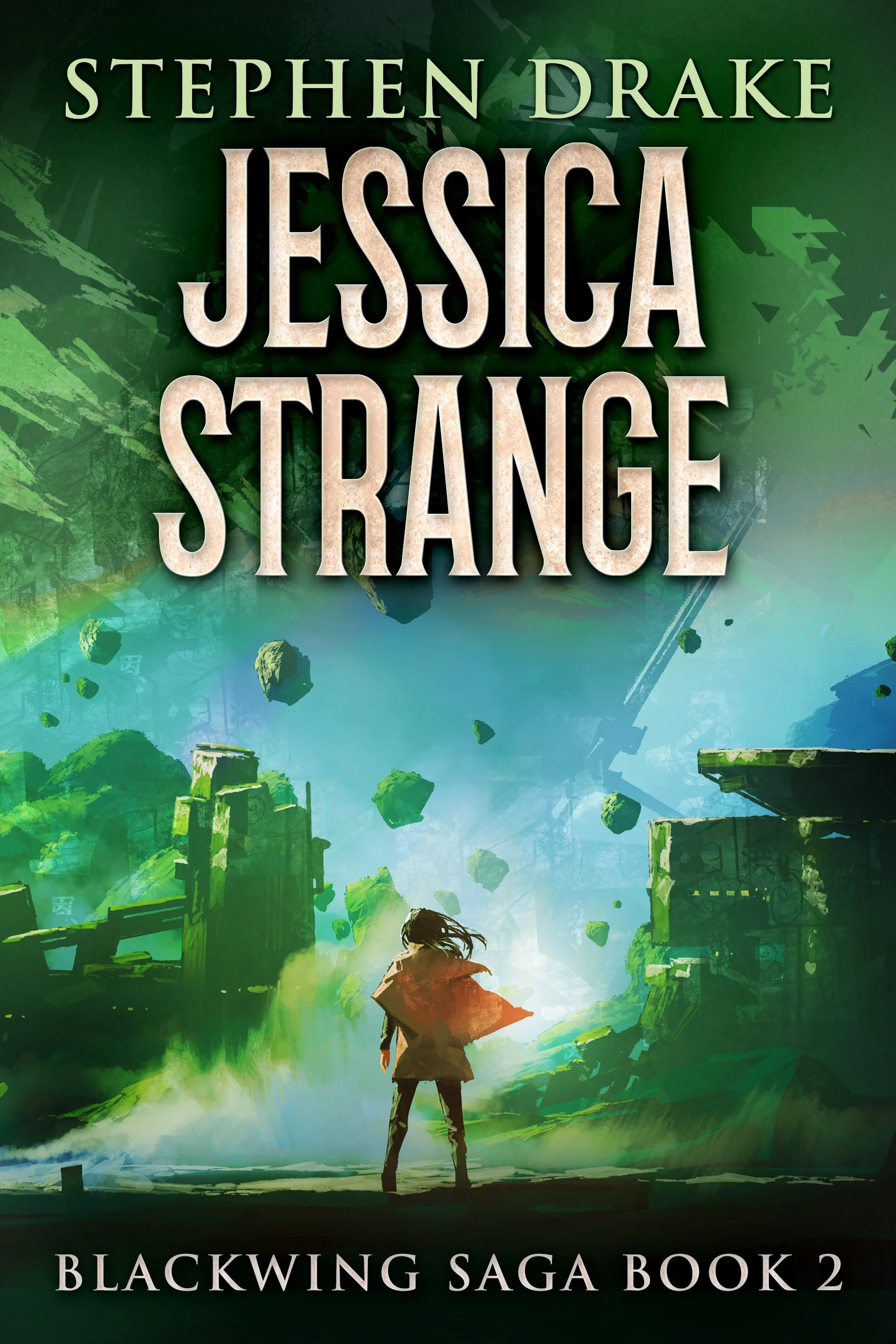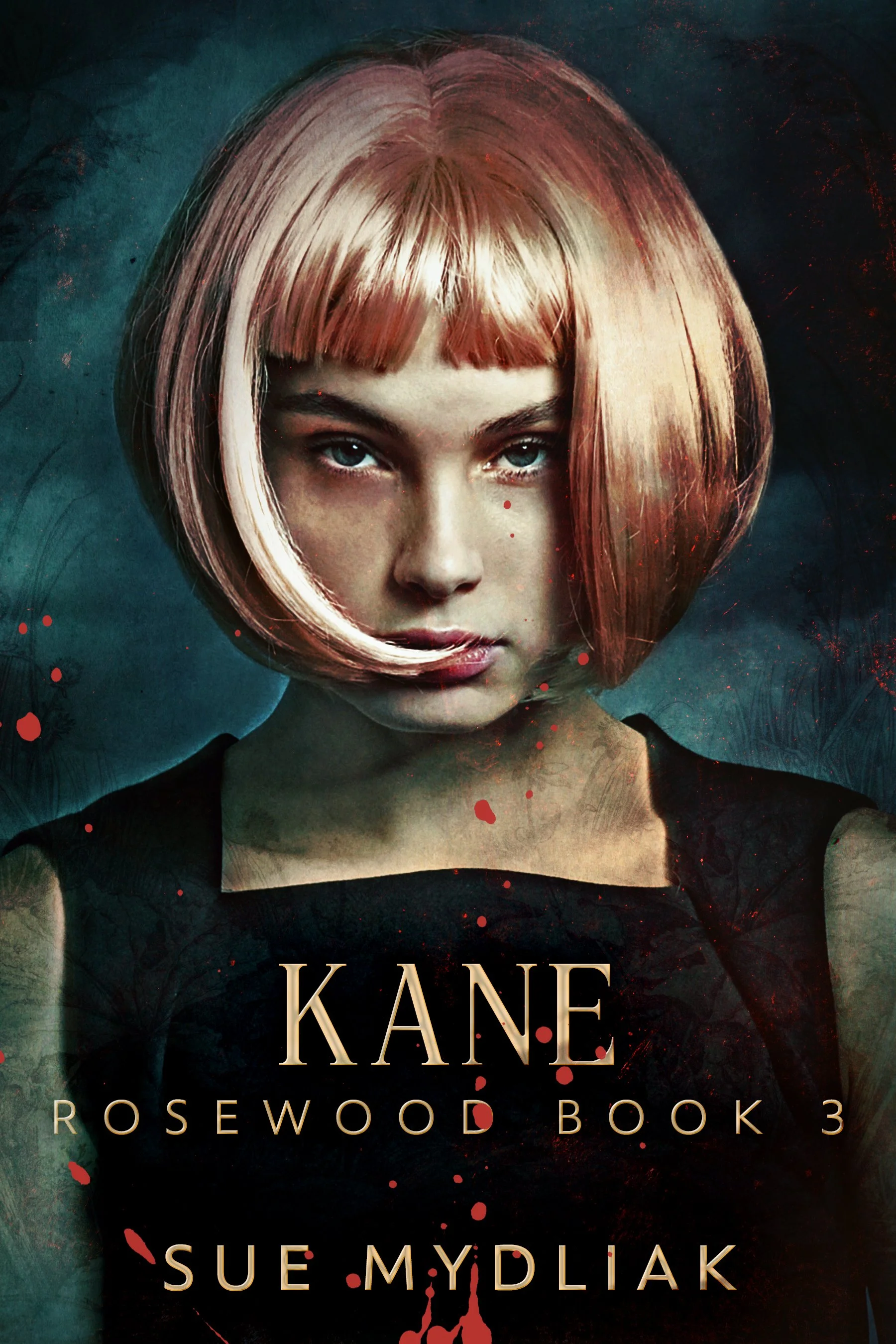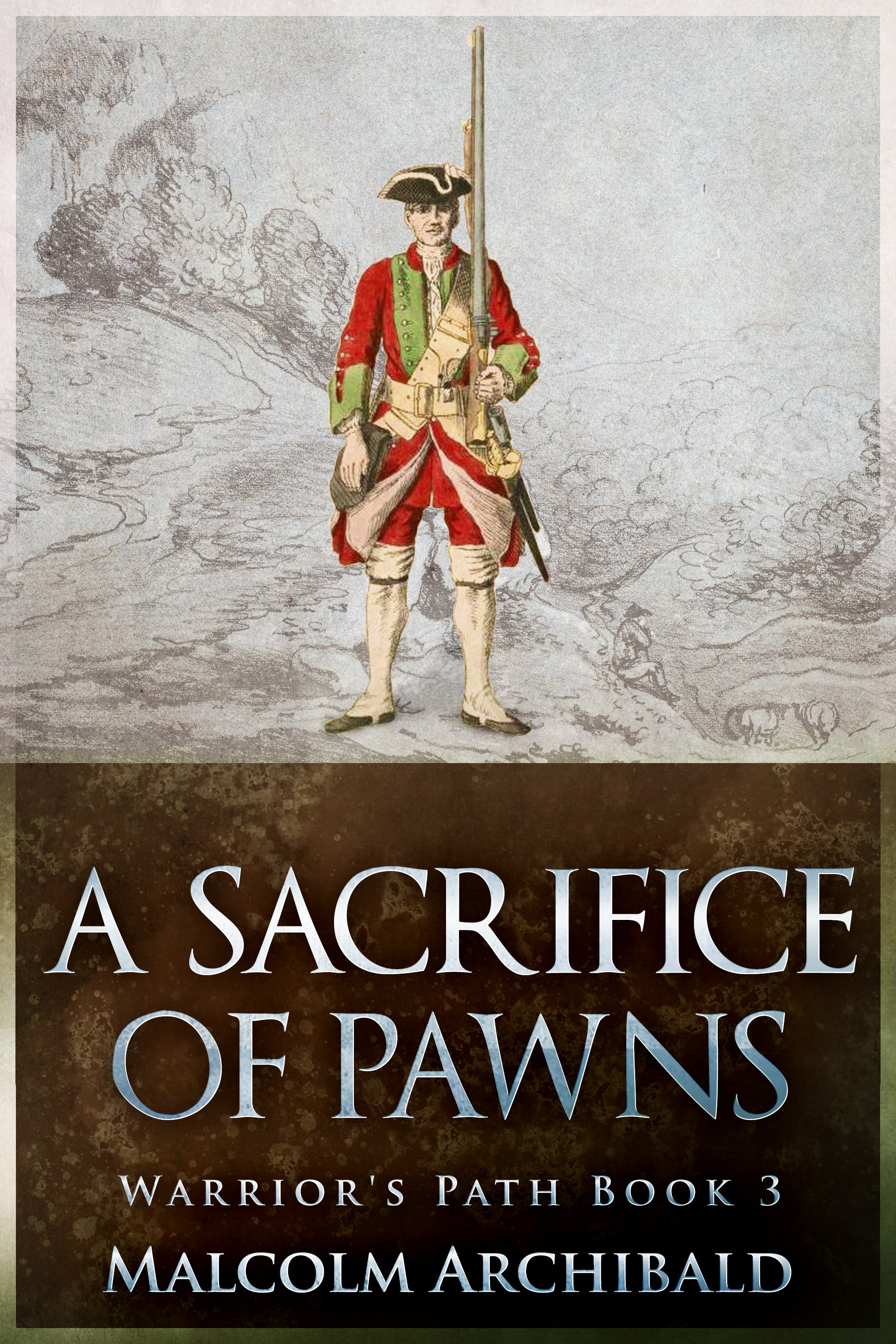Edge Of Reason (Warrior's Path Book 2)
Book summary
In "Edge Of Reason," set in 1759 Canada, Corporal Hugh MacKim of the 78th Highlanders seeks vengeance after an ambush leaves his beloved, Tayanita, mortally wounded by a tattooed Canadian. Haunted by nightmares, he rejoins the army, fights in winter skirmishes, and joins General Murray's Flying Picket to thwart French attacks. His quest for revenge against Lucas de Langdon tests his sanity amidst the brutal strains of war.
Excerpt from Edge Of Reason (Warrior's Path Book 2)
“They killed Tayanita,” MacKim muttered, as the dual emotional and physical pain threatened to overcome him.
“I know,” Chisholm said, his ravaged face set in sympathy. “Come on, Hugh, let’s get you to a surgeon.”
“They killed Tayanita.”
After those words, MacKim’s entire world dissolved in pain. He was unaware of Chisholm and Private Ranald MacDonald carrying him in a blanket to the ruins of Quebec. He was unaware of the fingers pointing to the raw wound across his head, or his blood that dripped onto the ground. He was only vaguely aware of the deep-eyed surgeon who examined him, and barely aware of the brandy an assistant forced down his throat. However, despite the spirit’s supposedly numbing effect, MacKim groaned as the surgeon stitched the long gash across his chest.
“Lie still, man,” the assistant grumbled, as MacKim writhed under his hands.
MacKim screamed as the surgeon tried to dress the horrendous wound on the top of his head, with the assistant attempting to hold his face still. After that nightmare of agony, there was nothing but pain, until MacKim recognised it as an old, trusted companion. It was there, waiting for him. It would not let him down. The physical pain shielded MacKim’s mind from the mental and emotional agony of Tayanita’s death, so he clung to the former as a counterbalance for the latter.
***
MacKim did not know how long he lay in the makeshift hospital. It might have been days or weeks. Time did not matter; only the mingled pains and his feeling of desolation. From time to time, he was aware of other men beside his bed, although he did not know that Chisholm and Private Ranald MacDonald were checking on his progress.
At length, as the Canadian autumn descended towards the long midnight of winter, MacKim’s head began to clear. He looked around the long room with its rows of suffering patients.
“Tayanita?” he called weakly.
“You’re awake, then,” an orderly said. “You were lucky. We thought you was going to die.”
“Lucky?” When MacKim tried to sit up, the recently healed wound in his chest protested. He gasped, grunted and fought the pain. His head pounded as if a hundred farriers were making a hundred horseshoes on top of his skull.
“I heard that the savages caught you,” the orderly said cheerfully. “They were scalping you when some of your regiment chased them away.”
“I remember.” MacKim looked down at his chest, where the long, puckered scar was inflamed and red, with prominent stitching where the surgeon had worked. He remembered the tall, tattooed Canadian, the Abenaki and the squat man with the flat English accent.
“Was there anybody else there when the Highlanders rescued me?” MacKim wondered if Tayanita was not dead. Perhaps he was wrong. Maybe he had imagined the bullet smashing through her skull.
The orderly screwed up his face. “Blessed if I know.”
“I have to find out,” MacKim said, swinging his legs out of bed.
“You’ll stay where you are,” the orderly said. “Your chest may be healed, but I don’t know what you’ll do about your head. It was as red-raw as fresh liver last time I saw it.”
“My head?” MacKim winced as he touched the bandages that swathed his head. His headache increased.
“The savages took half your scalp,” the orderly said, as MacKim slumped back onto his bed. “You lie there, Sawnie, and recover. It’s bedlam outside, anyway.”
Tayanita. The name ran through MacKim’s head, together with an image of the woman with whom he had intended to head west. Now, he was back in the army, a corporal in Fraser’s 78th Highlanders. If he were lucky, nobody except Chisholm would realise he had intended to desert. Lucky? The Canadians and Abenakis had killed his woman and robbed him of half his scalp. What was lucky about that? MacKim closed his eyes as the tiredness of physical weakness mixed with emotional strain overcame him.
Tomorrow, MacKim promised himself. I’ll try to get up tomorrow. Or maybe the next day. He closed his eyes as the image of Tayanita returned, with the musket ball smashing through her head. He felt the tears biting at his eyes.
***
“Has anything happened since I’ve been in the hospital?” MacKim asked.
Chisholm mused for a moment before he replied. “No. We’ve been sitting around on our arses doing nothing, just like you.”
“I thought I heard gunfire a few days ago,” MacKim struggled to sit up, but the flashes of pain in his head prevented the attempt.
“You did hear gunfire,” Chisholm said. “A French flotilla sailed down the river, and our artillery had a go at them.”
“Did we sink them?” MacKim asked.
“Not even one,” Chisholm said. “I don’t think we scored a single hit because they were out of range of our guns. That would be on the 23rd of November, I think.” He shook his head. “But never fear, little Corporal MacKim. Not long after, Canada provided a storm that sent three of them onto a sandbank and left them there.”
MacKim smiled, then winced at the pain even that simple gesture caused him. “The Navy would love that,” he said.
“Oh, the Navy loved it all right,” Chisholm said. “One of our frigates virtually denuded herself of men to strip everything from the largest French shipwreck. They were happily plundering when the damned Frenchie blew up. I heard that the French captain threw a match into the powder room, but that might only be a story. Our seamen were all lost, and the Frenchies boarded and captured our frigate, which had only a skeleton crew.”
MacKim sighed. “A victory for the French, then,” he said.
“A hint of revenge to pay us back for capturing the capital of New France,” Chisholm said.
“And a reminder that the French won’t give up easily,” MacKim said. “Is that all that has happened?”
“No,” Chisholm said. “While you’ve been lying at your ease, we’ve unloaded tons of stores and dragged them from the Lower Town to the Upper Town.”
“I’m glad you do something to earn your eight pence a day,” MacKim said. “Anything else?”
“There has been a bit of marching and counter-marching, and a lot of work on the fortifications here.” Chisholm grinned. “No doubt you’ll be doing your bit once you’re up and about.”
MacKim sank back. “Suddenly, I feel weak. I might need another few weeks in bed.”
“We’ll see you soon then, Corporal,” MacDonald said, without understanding the joke.
MacKim did not reply. For all his attempted humour, he felt sick at the thought of losing Tayanita. When he closed his eyes, he could see her face smiling at him through her deep brown eyes. And then he saw the musket bullet smash through her head, and a wave of intense hatred replaced his sorrow.
I will kill those men. I will kill that Canadian with the tattooed face, and that renegade with the flat accent and dead eyes. I won’t allow Tayanita to go unavenged.
The decision gave MacKim strength. After weeks of waiting to recover, he now forced himself to move, leave his bed and fight. He had a purpose in life once more.
***
“Reporting for duty, sir!” MacKim saw Lieutenant Gregorson study his head as if he could see the scraped scalp through MacKim’s bonnet.
“It’s good to have you back, MacKim,” Gregorson said. “Have you fully recovered?”
“Nearly, sir,” MacKim lied. He did not mention the terrible headaches that plagued him, or the nightmares in which he saw Tayanita slowly falling as pieces of her head sprayed around the ground. Such things, MacKim vowed, he would keep to himself. There were some secrets that a man did not wish to reveal to the world.
“If you are certain.” Gregorson continued to study MacKim’s bonnet.
“Yes, sir.” MacKim did not admit that the hospital had depressed him, with its daily intake of sick and dying soldiers. The army that Wolfe had led to victory was slowly disintegrating with scurvy and other diseases. MacKim was confident he would fare better in the company of active soldiers, rather than in a hospital bed. In the ranks, he would have duties to perform and his comrade’s banter to sustain him. In the hospital, all he had were gloomy thoughts and the moans of the sick.
“Report to your quarters then, Corporal,” Gregorson said.
“Yes, sir!” MacKim marched away, listening to the rattle of drums and hoarse shouts of a sergeant. He was back in the army, subject to iron discipline, ready to obey orders at an instant’s notice. He was a soldier of King George, a mindless killing machine, yet MacKim knew that he did not belong.
Before he entered the house that his company of Fraser’s 78th Highlanders had converted into a barracks, MacKim studied the city. The once-proud city of Quebec, the crowning glory of French Canada, was a mess. MacKim could think of no other word to describe it. The British bombardment with shot and shell had ruined nearly all the buildings in the Low Town, leaving hundreds as little more than rubble, and damaging what it had not destroyed. Knowing that winter was bitter-cold in Canada, General Murray had ordered the men to tear down all the wooden fences in the city for firewood, and then start on some of the wooden houses.
“Corporal!” Captain Donald MacDonald caught MacKim before he entered the barracks. “I have a working party collecting firewood for the barracks. Join us.”
I’m back, MacKim thought.
“See what we’re reduced to?” Chisholm said, as MacKim arrived at his side. “We’re common labourers now, not gentlemen soldiers.”
MacKim hefted a pile of floorboards on his shoulder and wished his head would stop aching. “It’s not why we accepted King Geordie’s silver shilling,” he said.
“Why did we join up?” Chisholm asked the rhetorical question.
“I joined up to avenge my brother’s murder,” MacKim reminded him, “and because the clan chief told me to.” He carried the floorboards through the streets, with Captain MacDonald in front giving directions.
“Clan chiefs have too much power, ordering men to war on a whim.”
“It was no whim,” MacKim said. “Fraser wanted to impress the government with his loyalty so they’d give him his lands back. We were just the small change he used to buy governmental favour.”
“Nice to know how important we are,” Chisholm said and led MacKim up a narrow street in the Upper Town, the section of Quebec on the west, furthest from the St Lawrence and closest to the Heights of Abraham. The barracks were in a collection of houses, mostly half-ruined, with roofs and walls damaged by the British bombardment when they besieged Quebec.
“Aye,” Chisholm said, as he made space for MacKim in the corner of one of the rooms. “This was somebody’s home once. War can be hard on civilians. They fight differently over here in the Americas, without the idea of quarter for the innocent.”
Thinking of Tayanita, MacKim nodded and collapsed onto his cot. It was close to the fire, as befitted his rank as a corporal.
“While you were lazing in the hospital,” Chisholm said happily, “the army had a splendid time plundering what our artillery left of Quebec.”
MacKim looked up from his cot. “Did they leave anything for me?”
“Alas, no.” Chisholm shook his head. “General Murray is coming down hard on looters, and everything else.”
MacKim placed his kit on the hard cot, checking to ensure everything was in order. He lifted a small square of colourful beadwork and closed his eyes. That beadwork was the last thing Tayanita had given him; she had made it herself and pressed it into his hand.
“So you remember me when I am not here,” Tayanita said.
“You’ll always be with me,” MacKim replied.
Tayanita held his gaze,with her deep brown eyes solemn. “We do not know what the future holds.”
MacKim held the beadwork. Tayanita had been correct; nobody knew what the future held. A few weeks ago, MacKim had all of Tayanita; now, he had only her memory and this small, colourful square. MacKim pressed the beadwork against his chest, feeling a surge of emotions from deep sorrow at her loss, to the vicious desire to avenge her.
“You’re back then?”
MacKim hurriedly hid the beadwork when Harriette Mackenzie entered the barrack room. He had known Harriette as Corporal Gunn’s wife, but when the French killed Gunn, Harriette had married Chisholm. A foul-mouthed, hot-tempered and warm-hearted woman, she greeted MacKim with a smile, flicked the bonnet from his head without a by-your-leave and examined his scarred head.
“I’m back,” MacKim confirmed.
Harriette pursed her lips. “What a bloody mess!” she said. “The Indians made a good job of you.”
“Thank you,” MacKim said. “It wasn’t the Indians. It was a Canadian and a renegade Englishman.”
Harriette tossed the bonnet back to MacKim. “You’re lucky, Hugh. Nobody can see the scar, otherwise you’d be nearly as ugly as Chisholm.”
MacKim forced a smile. James Chisholm had been badly wounded during the Fontenoy campaign in the previous war, the War of the Austrian Succession, and had remained in the army rather than returning to normal life. A deep burn covered half his face, twisting his lip into a permanent scowl and narrowing one eye. Chisholm was very aware of his looks and avoided civilians if he could.
“Aye, I married the ugliest man in the army,” Harriette said. “Well, when the French or Canadians or the Indians kill James, you’re next on my list to marry, Hugh,” she blew him a kiss, “as long as you are still alive then. I seem to be attracted to the ugly ones.”
“Thank you.” MacKim gave an elaborate bow. “I am honoured.”
Harriette slapped MacKim’s shoulder. “Until then,” she said, “I’m Chisholm’s, so keep your hands to yourself.” She swivelled her hips towards him, temptingly.
“Come on, James. You’re off duty, and I want your body. We’ll make Hughie jealous.” Grabbing hold of Chisholm’s hand, Harriette steered him to the ragged blanket that screened off a corner of the room; behind the blanket was the only privacy married other ranks knew.
Holding the square of beadwork, MacKim left the two of them together and stepped out of the barrack-room to look around Quebec.
It was the cold that MacKim noticed most. The hospital had been chilly, but outside, the temperature dropped until every breath became painful, and condensation froze on his chin. Within a few moments, the cold reached MacKim’s knees and began to spread upwards.
Stamping his feet, MacKim walked as fast as he could on the icy streets. The devastation was appalling, with fragments of stone buildings thrusting upward like broken teeth in a giant’s mouth and piles of rubble littering the lesser-used roadways. Every so often, MacKim came across one of the civilians who the British bombardment had forced from their homes. When the British took possession, they made a bad situation worse by requisitioning the least damaged houses as billets for the men and forcing the citizens out. Some Quebecers moved into friends’ houses, and many left Quebec altogether. Ragged, cold and resentful, the people of Quebec avoided MacKim as if he carried a disease.
“I don’t blame you at all,” MacKim said, as one young boy retreated into the corner of a building and threw a stone. “I’d do the same if I were you.” The missile missed MacKim, to bounce harmlessly from a wall. MacKim remembered the aftermath of the Jacobite Rising in Scotland when the British Army had spread terror across much of the Highlands. Back then, he would have happily stoned anybody in King George’s scarlet coat.
“Here.” MacKim reached inside his sporran for his last scrap of biscuit. “It’s not much, but better than starving.” He tossed it to the boy and spoke in French. “It’s a biscuit. It’s hard as stone so watch your teeth.”
The boy looked at MacKim, snatched the biscuit and stood against the wall, cramming the food into his mouth. MacKim favoured him with a wink.
“Feeding the enemy?” a grenadier asked, with a sneer on his face.
“Children are not my enemies,” MacKim said.
The grenadier was a head taller than MacKim, with his mitre hat making him taller still. He looked down on MacKim, as if about to say something else, saw the expression in MacKim’s eyes, changed his mind and walked away.
MacKim grunted, released his grip on the hilt of his bayonet and realised the boy was still watching him. He mustered a grimace that was nearly a smile and walked away, gasping at the cold.
When MacKim returned to barracks, Chisholm was cleaning his musket. He grunted when he noticed MacKim’s discomfort.
“Aye, the cold gets to your essentials, Hugh.” He winked at Harriette. “What do you think, Harriette?”
Harriette grinned. “The nuns in the Ursuline Convent will help you there, Hughie.”
“Who?” MacKim stood as close to the fire as he could, hoping that frostbite had not set in.
“The good ladies of the convent are not happy with the Highlanders,” Harriette said, with a grin. “Every time a Highlander bends forward, half the women of Quebec – and a disturbing number of the men – gawp at what is revealed.” Harriette laughed. “The ones that act terribly shocked are the ones who look the most assiduously.”
MacKim forced a smile. “That sounds about right.”
“Apart from the nuns, the local Canadian women tend to like Highlanders,” Harriette said. “General Murray has already banned marriages between the Canadians and us.”
MacKim felt the heat gradually return to his body. He could not imagine why any British soldier should marry a Canadian woman after the atrocities during the campaign to capture Quebec.
“The final straw came only the other week in Mountain Street,” Chisholm muttered, as he inspected the lock of his musket minutely.
“What happened?” MacKim asked.
Chisholm’s grin made his burn-scarred face even more hideous. “Do you remember that sleet storm? Oh, no, you were too busy lying in state with the nurses pampering you like a baby.”
“I remember,” MacKim said. “The frost froze the blankets to my bed.” He waited for a response to his lie.
Chisholm nodded. “As I said, you were lazing in bed when we were carrying out your duties, Corporal MacKim.”
“What about Mountain Street?” MacKim asked.
“The frost covered the streets in sheet ice. Men and horses were sliding and slipping and falling all over the place.” Chisholm’s grin became even broader. “It was quite amusing to see the streets full of men and even women falling on their faces and lying on their backs.”
“Major Ward’s wife had fun when she took a tumble,” Harriette said, laughing. “She was face-down with her skirt up over her waist and half the garrison laughing.”
“Forget her,” Chisholm said. “That day of the bad ice, General Murray ordered the 78th to mount guard at the Royal Battery in the Lower Town.”
Although MacKim had not had time to learn Quebec’s geography, the names of Upper Town and Lower Town told their own story. “That’s downhill then,” he said.
“Aye, hard by the river. We had to descend Mountain Street, which is steep. Jamie Munro lost his footing and fell, with his kilt around his chest." Chisholm could not stop himself laughing. "At least half a dozen nuns were staring in shock.” He bit off the end of a twist of tobacco. “It may not have been shock, but the sight certainly made them stare.”
MacKim tried to share Chisholm’s amusement, but Tayanita’s memory interfered.
“Well,” Chisholm continued, “I was next in line, and had no intention of ending up in disorder like Jamie Munro, or of providing free amusement to the nuns, so I sat on the ground and slithered down. My kilt slid up, so I was a bare-bum warrior, with the nuns giggling fit to frighten the French, which they are, of course. And ever since then, the nuns have been knitting long woollen hose as if their lives depended on it – or our modesty, perhaps.”
“More than your modesty, Chisholm!” Harriette added coarse details that had the two other wives in the room laughing.
Despite Chisholm’s attempt at humour, MacKim knew that the garrison of Quebec was suffering terribly with the cold, and the 78th was the worst affected. Men sick with frostbite and scurvy filled the hospital, and the list of dead increased every day. With the ground frozen too hard to dig graves, General Murray piled the corpses outside the city, a macabre wall of the dead, frozen together, a gruesome reminder of man’s mortality. Even the men supposedly fit for duty were coughing and sneezing.
“Things could be worse,” Harriette said. “Imagine how bad it would be if Wolfe had lost his battle.”
MacKim nodded without replying. If the French had won on the Heights of Abraham, he might still have had Tayanita. He pushed the thought away.
As the weather grew colder, desertions increased, and General Murray used ever more extreme measures. Floggings grew more frequent, with sentences of hundreds of lashes, and some men were hanged.
Yet none of that mattered to MacKim as every night, unless he were on sentry duty, he lay in bed clutching Tayanita’s beadwork and thinking of the two men he had to kill.

















Praesent id libero id metus varius consectetur ac eget diam. Nulla felis nunc, consequat laoreet lacus id.